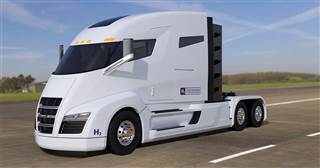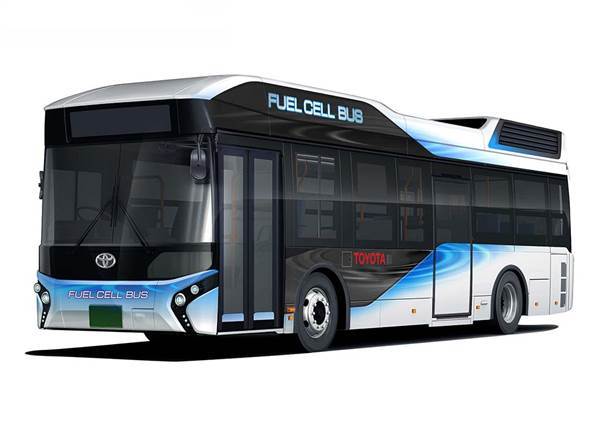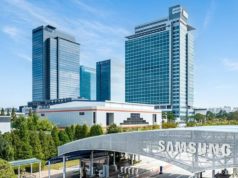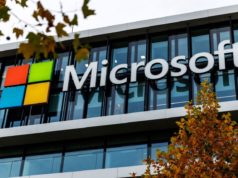Several car makers are betting that hydrogen technology can clean up the nation’s heavy-duty truck fleet — but will climate-change-skeptic President-elect Donald Trump kill their plans?
Trucks produce about 20 percent of the greenhouse gases from the transportation sector. Manufacturers such as Toyota and Salt Lake City-based start-up Nikola Motor Co. are hoping to reduce that number.
Nikola’s newest big rig looks, at first glance, like the cab of any other heavy-duty truck you might see rolling across America’s highways, but a closer inspection reveals some big differences.
Related: How Toyota Is Doubling Down on Hydrogen
Instead of diesel fuel, the tanks on the side of the Nikola One semi-truck prototype store hydrogen, and under the hood, there’s a fuel-cell stack, rather than a big internal combustion engine.


Toyota also recently began selling its first fuel-cell passenger car in the U.S. and will launch its own hydrogen truck project in the coming months.
Sometimes called “refillable batteries,” fuel-cell vehicles can overcome the range issues that limit the potential of electric vehicles. But they face their own challenges, primarily the lack of a nationwide hydrogen production and distribution network.
While the outgoing Obama Administration’s EPA supports the development of that infrastructure, many proponents fear the incoming Trump White House might unplug both hydrogen and battery-car programs.
Now in talks with several state governments, Nikola hopes to announce in mid-2017 the location of a $1 billion assembly plant that, it claims, could eventually produce as many as 50,000 heavy and medium-duty trucks annually.
Automakers and Their Moon Shot
Nikola isn’t the only company betting on hydrogen, however. Toyota recently began limited sales of its Mirai fuel-cell vehicle in California, joining Hyundai which introduce the Tucson Fuel-Cell Vehicle there in 2015. Honda is just launching its own hydrogen model, the Clarity, and several other manufacturers have products of their own in development.
The hydrogen fuel-cell was first conceived in the 1850s, though the technology only found serious application more than a century later, providing electricity for the Apollo moon craft.
Automakers have been tinkering with hydrogen power for decades, but the recent launch of products like the Mirai has kicked off the first serious effort at commercialization by the auto industry.
Fuel-cell vehicles rely on a system called a “stack” to combine pure hydrogen with oxygen from the air. That generates a flow of current that can be used to run the same motors found in an electric vehicle. Unlike a pure battery-electric car, fuel-cell vehicles, or FCVs, do have an exhaust pipe, but the only byproduct is pure water vapor.
And though federal regulations have clamped down in recent years, trucks also produce a disproportionate amount of smog-causing oxides of nitrogen and the particulates that have been linked to lung cancer.
The Tokyo Connection
While start-ups have a high attrition rate, hydrogen proponents say they’re encouraged by the fact that Nikola One isn’t the only company considering the potential for hydrogen in long-range trucking.
“Toyota has long maintained that hydrogen fuel cell technology could be a zero emission solution across a broad spectrum of vehicle types,” the Japanese maker said in a brief statement announcing its own program. “The scalability of this technology is enabling the automaker to explore a semi-trailer truck application for a California-based feasibility study.”
Toyota is already scaling up the fuel-cell system found in the Mirai. The world’s largest automaker just last month said it will begin selling hydrogen buses and will work with the Tokyo Metropolitan Government to get a fleet of as many as 100 of those vehicles into service ahead of the 2020 Olympics which will be held in the Japanese capital.


Such a project faces a number of technical challenges. It’s one thing to power a 4,000 passenger car, or even a city bus. It’s another to provide enough energy to propel a 70,000-pound 18-wheeler that might have to travel across country. That’s been the big drawback for those who would like to use battery power for heavy trucks. They’re so bulky and heavy that they’d slash a truck’s payload — while also requiring drivers to constantly stop and spend hours recharging.
Related: Paris Motor Show Highlights Electric and Hydrogen Technologies
The good news is that electric motors do produce large amounts of load-pulling torque. But unlike batteries, hydrogen is light. It can be stored in reasonably compact tanks capable of delivering extended range. Nikola Motors claims its Class 8 rig will get anywhere from 800 to 1,200 miles between refills — and the fueling process would take no more time than it currently requires to refuel a comparable diesel truck.
Meanwhile, Nikola claims its system would have an equivalent fuel economy of 15 to 20 miles per gallon — or more than double even the most efficient of today’s diesel semi rigs.
The Car Conundrum
The bigger challenge is the same one facing manufacturers hoping to put more fuel-cell passenger cars on the road. There’s no widespread refueling network in the U.S. As a result, Toyota, Honda and Hyundai are only selling their fuel-cell vehicles in select regions of California where hydrogen pumps are open to consumers, notably around Orange County, the San Francisco Bay area, and the state capital of Sacramento.
California regulators have approved funding to set up a broader state-wide network of hydrogen pumps, and several other states are considering similar moves. But a nationwide distribution network would be critical if hydrogen-powered trucks are to make major inroads into the country’s freight transportation system. While there has been support from the Obama Administration, it is far from certain such a costly program would be accepted once…






